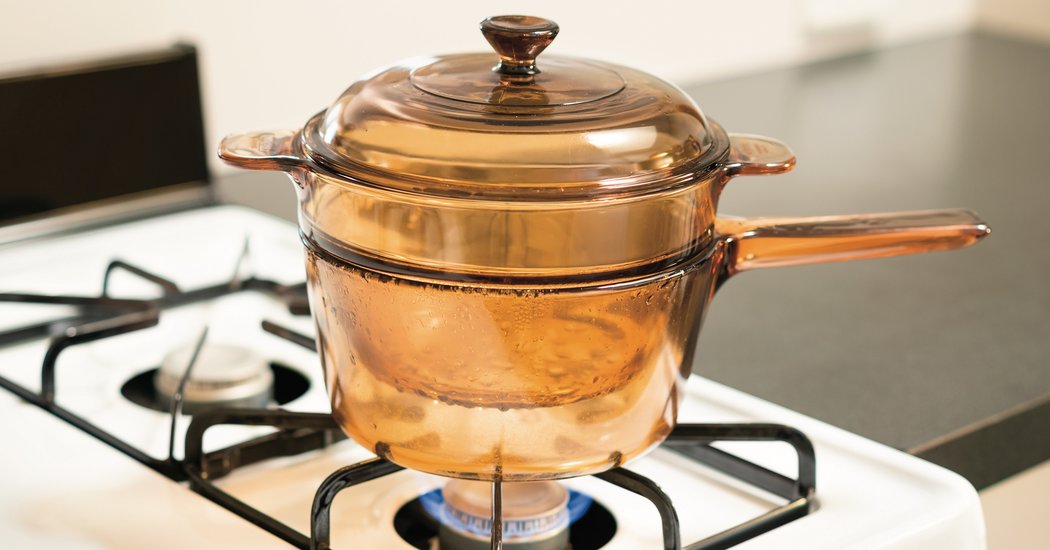
Four to five times a week, I reach into the cabinet to the left of my stove and pull out my ugliest, least-pedigreed pan. Actually, it’s two pans: a double boiler. The bottom is scuffed and darkened from decades of use; the insert, which is never meant to come directly in contact with heat, has swollen because someone who prefers not to be named put it directly on the burner.
No one else seems to consider a double boiler an essential piece of equipment. You won’t find it on the lists compiled by even the most down-to-earth food writers. I can’t recall the last time I saw one mentioned in a recipe. Yet it’s essential to me, because I’m a work-at-home writer who likes to reheat leftovers for lunch and make brownies on the spur of the moment. (Every work-at-home writer needs a way to procrastinate; mine is baking, although cleaning the baseboards with a Q-tip will also do in a pinch.)
Reheating leftovers in a double boiler produces a superior, if slower, result when compared with food heated in a microwave. I have met people who want to argue this point, who claim that my taste buds couldn’t possibly tell the difference, but you don’t actually need a great palate to find the dead, cold spots in leftovers that have been microwaved. And while a double boiler takes longer, it requires virtually no oversight. It’s hard to burn something — unless, ahem, you put the insert directly on an open flame.
Yet the thing I most appreciate is that a double boiler is not a microwave. I hate microwaves. I didn’t grow up with one, and I’m not going to grow old with one. In that way, I am channeling my late father, who was highly skeptical of many things.
A hypochondriac, my father often played his many worries for laughs, but they were real. He worried about jaundice. (His feet would turn yellow from wearing loafers without socks.) He worried about cholesterol. He worried about skin cancer — justifiably, as it turned out. He worried that his beloved martinis would lead to a fatty liver. He quit them on a regular basis, usually at year’s end; they always reunited by Valentine’s Day.
Most of all, my father worried about radiation. He ordered my sister and me to sit 10 feet from our black-and-white television. He fought the dentist over X-rays, instructing his daughters to do the same. The most famous story about my father’s anti-radiation stance involved a waterproof watch, a Christmas gift. Toweling off after a shower, he recalled reading that luminous watch dials might emit radiation. He had to know immediately if his new watch glowed in the dark. But it was a weekday morning, bright and sunny. He tried to check the dial while standing in his closet, but the door would not latch. He went into my mother’s closet. The good news was that his watch did not shine. The bad news was that the closet door had locked behind him and there was no one else in the house. A cleaning lady would arrive soon. Bad news: He would have to greet her naked or wearing his wife’s clothes. Naked or in a dress, naked or in a dress, naked or in a dress? My father, born in 1929, was an exceedingly modest man. He kicked the door down.
When microwaves became ubiquitous in the 1970s, it was understood that the Lippman household would continue to make stovetop popcorn. Do microwaves release harmful radiation? Only if they’re improperly sealed or leaking, according to the Food and Drug Administration. But I don’t actually care anymore.
None of the things my father feared — radiation, cancer — killed him; he died after a sudden stroke in 2014. The death of an 85-year-old man who has suffered two falls in less than 12 months can never be said to be unexpected, but what happened next was: I took over his neuroses the way I took the never-worn socks my mother had knitted for him a few weeks before his death.
When airport travel, a big part of my life, requires me to use the screening booths, I now request pat-downs, knowing full well I would be exposed to more radiation on the flight. At the dentist, I am perversely proud when I glimpse my dental chart: Refused X-rays. I would probably worry about my cellphone if my father had ever owned one, but that technology never became part of his life. Doesn’t everyone do this? Assume a habit or an everyday item that keeps a loved one close? My father’s quirks are my inheritance, the way I keep his memory alive.
I never use my double boiler without thinking about him. I even like to use it to make popcorn as he taught me — just the bottom part, three “testers” in a tablespoon of oil, then a half cup of kernels, shaking the covered pan constantly, letting a little steam escape, bringing the heat down steadily, removing the pan as soon as there’s a long lull between pops. My popcorn has been eerily perfect as of late: no hulls, no burned bits. What I don’t know is if I love all double boilers as much as I love this one in particular. Although neither my sister nor my mother can confirm it, I believe that mine is the castoff double boiler bequeathed to me when I moved into my first apartment, one that has now moved with me eight times over 40 years. A cheap thing, a pot no one would envy. But if I’m right, then the handle I hold as I shake the popcorn is one my father held, too.
I’m just going to say that I’m right.




